The REAL military watch – Stocker&Yale Sandy 490 Series I
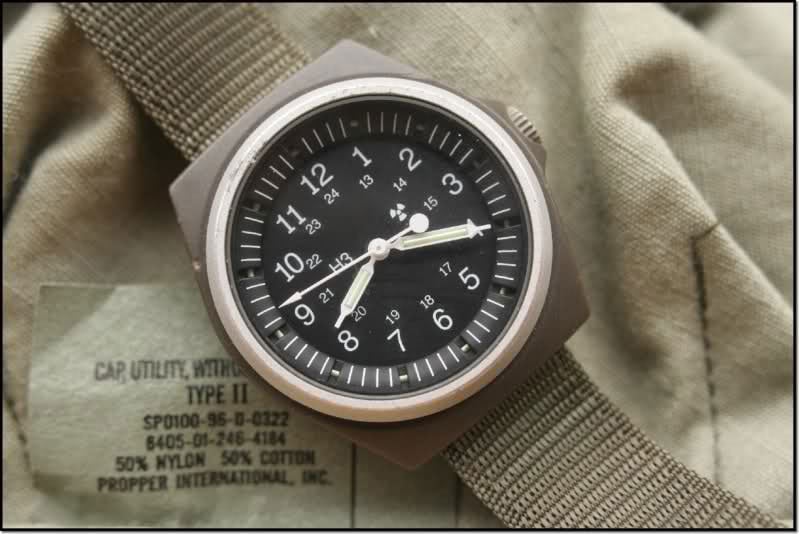
Unlike some marketing campaigns want us to believe, not many people in the military have the luxury of wearing large, bulky watches. No matter how great a 44mm watch may look with polo and chino’s while enjoying some after work cocktails, it becomes quite a liability on the battlefield. Here is the watch real soldiers wear… made by Stocker & Yale.
Light, small and accurate are more suited to the needs of modern day soldiers. Since wars are quite expensive, the governments that finance them also prefer that the watches used on the battlefield don’t put too much pressure on the budget. Can such a watch ever be interesting for a watch aficionado? In case of the Stocker & Yale Sandy 490 Series I for sure!

Stocker & Yale can look back on a long history as supplier to the US Armed Forces. Amongst their products are also watches. The Sandy 490 finds its origin in an embarrassing situation for Stocker & Yale. In 1988, during a routine control in an army depot in Pennsylvania, a geigerteller showed elevated levels of radiation. The source turned out to be Stocker & Yale Sandy 184 watches. To comply with military requirements they applied the numerals and hands with tritium. However, the geigerteller indicated that some watches had up to 100 times the maximum radiation level allowed from the watch.
Ironically it was also Stocker & Yale that put pressure on solving the problem. For their military compasses Stocker & Yale already used tritium in little vials containing the radiation. They wanted to apply the same technology to their watches. However, the current military requirements prevented the military from purchasing such watches since they didn’t comply with the requirements. Stocker & Yale successfully convinced the US government that an update of the requirements was a necessity. In 1989 Stocker & Yale started the development of the Sandy 490, and it was accepted shortly after by the US Department of Defense. It could immediately report for active duty, because the first Gulf war was about to break loose.
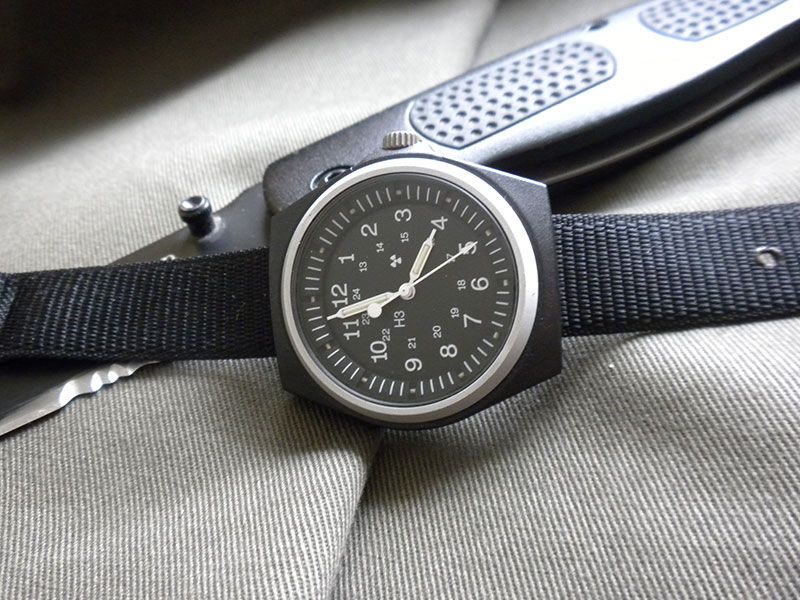
By itself an interesting story, but what should make the blood of a watch enthusiast really pumping is that this military watch has a Swiss, mechanical heart! Stocker & Yale fitted the Sandy 490 with nothing less than ETA 2801 manual wind movement. No blued screws or Geneva stripping for the Sandy 490, but that doesn’t take away from the fact that this high beat movement is a solid choice. A hack seconds function enables precise time setting, so operations with military precision are no problem for this watch.
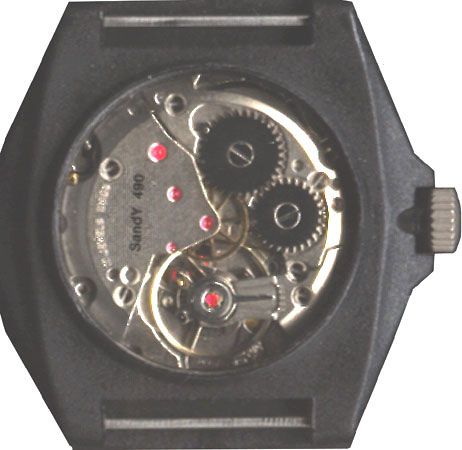 The rest of the movement breaths functionality. The 34mm matted black case is made from fiberglass composite, making it tough, light and small enough to hide under a cuff. The bezel is made from matted aluminum and immediately focuses your eyes on the dial when looking at the watch. This dial has actually a nice treat in store. The tritium vials are placed at a 5 minute interval in the outer ring of the dial. Since this one is raised you don’t see where the vials are connected to the dial, so this gives the impression of a little TL light. The tritium vials are also placed in the hour- and minute hands of the watch. To eliminate as much chance of error when reading the time in the dark, the tritium vial at 12 o’clock emits an orange light, while the rest is light green.
The rest of the movement breaths functionality. The 34mm matted black case is made from fiberglass composite, making it tough, light and small enough to hide under a cuff. The bezel is made from matted aluminum and immediately focuses your eyes on the dial when looking at the watch. This dial has actually a nice treat in store. The tritium vials are placed at a 5 minute interval in the outer ring of the dial. Since this one is raised you don’t see where the vials are connected to the dial, so this gives the impression of a little TL light. The tritium vials are also placed in the hour- and minute hands of the watch. To eliminate as much chance of error when reading the time in the dark, the tritium vial at 12 o’clock emits an orange light, while the rest is light green.
The rest of the dial has a lay-out one can expect from a military watch. Bright white Arabic numerals at every hour position indentifying both the AM as well as the PM hour and clear, long stripes to indicate the minutes that don’t have a tritium valve. Furthermore shows the dial “H3”, the chemical symbol for tritium, and a radioactive symbol. There is however no need to worry. Because the tritium is contained in the vials your geigerteller won’t measure an elevated radioactive level outside the crystal.
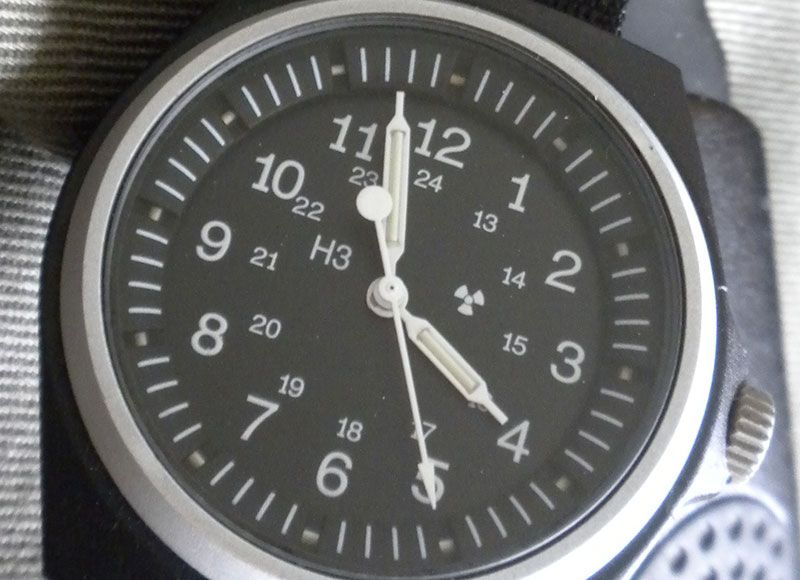
Although the Sandy 490 was used in active duty, it ended not so glorious for this model. Because of the first Gulf war there was an immediate demand for these watches, but Stocker & Yale could not produce them as fast as Marathon, who developed the 348 as competitor of the Sandy 490. Because of that the majority of the orders went to Marathon, leaving Stocker & Yale in the dust. For watch collectors this makes the Sandy 490 only more interesting. In 1999 the US Department of Defense changed the requirements for their army watches once again. Visibility at night was not a requirement anymore, since the technology of warfare has developed so fast that American troops could be located by the light emitted from their watch dials.
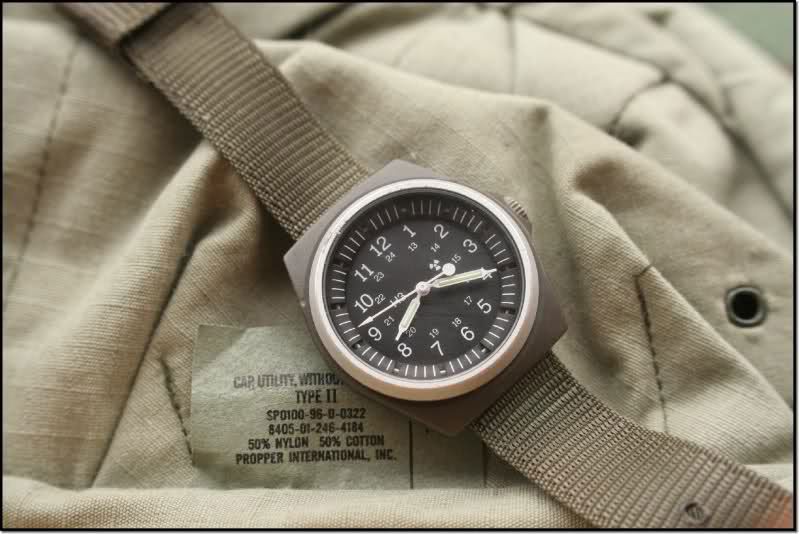




4 responses
You are such a gifted writer! Thanks for your interesting read on this mil watch. Can you please offer your opinion on what are some of the more affordable military watches, that I can invest in and hope they appreciate over time like a bottle of vintage wine. I love the TIMEX military watches just because they are such an oxy moron. My friend was issued a TUDOR divers when we where in the military and he recently gave me that one, its really good looking. Well thank you! Sincerely Jim
Hi Jim, a Tudor dive watch, issued by the military, should be considered a keeper and a great investment. Timex does not much in terms of collectibility nor increased value over time. Keep the Tudor in good shape, preferably with box and papers, and it will keep its value over time.
My Sandy is still working. The plastic case which holds the strap wore out. A collector did not want the watch, but he bought the strap from me; he attached it to a Rolex Mariner….a real Rolex Mariner! The watch was my first when I joined the Army. It stayed with me until I retired, twenty-one years later.
I have a Sandy 490 that need to be cleaned and regulated. Does any one no where one can get repairs done?
James Thomas [email protected]